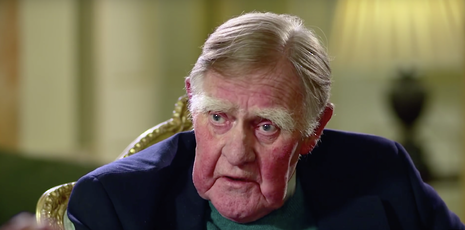Sir Bernard Ingham: ‘In a mature democracy the press is going to be adversarial’
Joel Nelson meets with Margaret Thatcher’s chief press secretary to discuss spin doctors, Tony Benn, and his favourite prime minister

Nobody understands the nature of the relationship between the British government and the media better than Sir Bernard Ingham. As Margaret Thatcher’s chief press secretary for 11 years, he was dealing with the national media when Alastair Campbell was a small time journalist, when Peter Mandelson had a moustache, when Tony Blair was an unknown.
As the prime minister’s chief spokesman Sir Bernard played a central role in explaining the actions of the governments of 1979-90 and presenting Thatcher to the nation. During the course of a rare interview, I am keen to probe the nature of his interactions with the press and his memories of the governments with which he was so intimately involved.
“I think that we should welcome a press that is critical but I think it would help if they were generally constructively critical.”
Sir Bernard Ingham
I begin by asking him to describe the ideal relationship that should exist between government and the media. He pauses before answering that, “As Mrs Thatcher said, you can’t have a free society without a free press,” continuing that “if you expect the British media to be in bed with the government then I think you are asking for a very decadent society. I think that you just simply have got to face the fact that the press sometimes think they’re the alternative government. I think that we should welcome a press that is critical but I think it would help if they were generally constructively critical.”
He shrugs as he notes that “In a mature democracy the press is going to be adversarial. Just as parliament is adversarial. Why should we expect the press to be different?”.
Anybody seeking to deal with the press, he says, has to be trustworthy and credible. “Either you’re credible or you are incredible,” he tells me, “and I don’t think a press secretary who is incredible is any use to man or beast, least of all to ministers. So all the time I was there I was conscious of trying to protect my credibility. Now that didn’t meant to say that you don’t try to put a positive construction on difficult issues but if you promise the earth and nothing comes then you’ve damaged your government and I think that’s what has happened a lot in recent years. They’ve promised the earth and delivered very little.”
I ask him when this change came about. He doesn’t skip a beat, instantly answering: “May the second 1997. When Tony Blair came in. Their first act was a piece of spin-doctory. They got all the Labour Party members to wave flags in Downing Street. I mean how juvenile can you get? And within a week Campbell and Mandelson had met the heads of information and in effect told them you do it our way or not at all. By the end of the first parliament there was only one chief information officer they inherited who was still in post. An unprecedented turnover and I blame them for damaging our democracy.”
As we speak, “Mrs T”, as Ingham affectionately refers to her, is mentioned a great deal. They were friends as well as colleagues and few knew her mind as well as he. I am consequently interested in hearing his thoughts upon last year’s attempts, by both Leavers and Remainers, to claim that, were she still alive, the former prime minister would have supported their cause.
His answer is balanced as he notes that “Mrs Thatcher did not like plebiscites. She thought they were the tool of dictators and, in so far as you can be sure, I doubt whether she would willingly have gone into a referendum. That’s the first point. I think the second point is that she never, in my presence at any rate, talked about leaving the European Union or whatever it was at the time.”

But, he continues, “I do wish people wouldn’t rush to judgment. I don’t see how on earth you can tell people what she would have done when she left office in 1990 and last year, when they were saying it, it was 2016. 26 years afterwards when she had great difficulty understanding what was going on. It was very sad but, before that, she was a severe critic of the EU.”
He clearly immensely enjoyed working at Number Ten, recalling that “It was exciting. First of all I thought I was in for a terrible towelling when I went there. I thought it was going to be really very hard and yet I found it relatively easy because she knew what she was doing and she was able to communicate to me what she was going to do and stick by it.”
He continues, with increasing enthusiasm: “Secondly, she wasn’t obsessed with the media. I think I was blessed among press secretaries that I had a prime minister that really didn’t bother with the media unless she felt that her policies weren’t getting over. She knew what she was doing, secondly she was consistent, thirdly she had the heart of a lion and a determination beyond imagining. I mean six years for her economic policy to show any signs of real success!” He trails off, shaking his head.
Though authoritative on the politics of the past, Sir Bernard maintains a strong interest in those of the present. He still writes for the Yorkshire Post and is typically blunt when discussing Theresa May and Jeremy Corbyn. When looking at the Conservatives, he declares, “You don’t know what their philosophy is. I think one reason is that government has always promised too much and it has become a junkie on public money.”
He continues, “I think the Tories don’t really know where to go as a party. They don’t have the kind of philosophy that Mrs T brought to the business of government and you might say Labour doesn’t have the kind of philosophy that Attlee brought to government. It seems to me that there is no point in having centre parties that don’t believe in anything other than being nice to people.”
He reserves special censure for Corbyn, telling me that the Labour leader “has never had an original thought, in my view, for forty years, probably longer, who wants a socialist society passionately, but can’t see where it all went wrong. Now I don’t mind people having views but I do expect them to learn from experience.”
The experience to which Sir Bernard alludes is the disaster of the 1970s, when union strife, economic malaise and a deficit of left-wing solutions combined to throw the Labour Party out of office for 18 years. Sir Bernard watched this first hand while working as a civil servant for Tony Benn and Barbara Castle, two titans of the Labour Left, before the Conservative election victory of 1979.
As our time is almost up, I ask him what it was like to work for Benn. He was, Sir Bernard tells me, “a wonderful person to work for when he wasn’t playing politics. Wonderful sense of humour, marvellous to travel with. It was only when he started playing politics that he went barmy.”
I laugh and thank him for talking to me
 News / SU reluctantly registers controversial women’s soc18 December 2025
News / SU reluctantly registers controversial women’s soc18 December 2025 News / CUP announces funding scheme for under-represented academics19 December 2025
News / CUP announces funding scheme for under-represented academics19 December 2025 Features / Should I stay or should I go? Cambridge students and alumni reflect on how their memories stay with them15 December 2025
Features / Should I stay or should I go? Cambridge students and alumni reflect on how their memories stay with them15 December 2025 Fashion / The art of the formal outfit 18 December 2025
Fashion / The art of the formal outfit 18 December 2025 Lifestyle / Summer lovin’ had me so… lonely?18 December 2025
Lifestyle / Summer lovin’ had me so… lonely?18 December 2025









